.....When I was learning how to play
pool there were no books, no videos, no instructors and no leagues
to play in. The best way to learn was to watch. I was privileged
to see some of the greatest and some of the not so great. My
purpose for publishing my pointers insrtuctional column is not
only to inpart pool knowledge to my viewers but to share with the
public what these great players from the 1980s and 1990s looked
like. Through my trusty Canon, for a moment in time they are immortalized.
Some are still here and some are gone and I still remember the
joy of watching them play.

DON'T STAND; DON'T STAND
DON'T STAND SO CLOSE TO ME
.
Harry Potter's Invisible
Cloak, Please
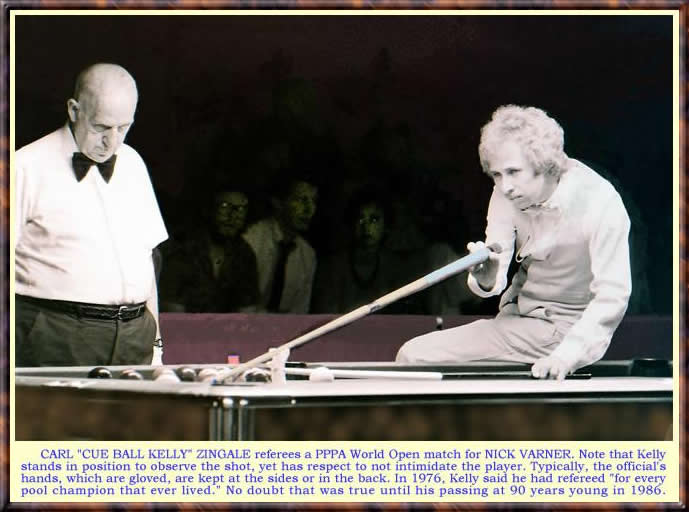
…..REFEREES
ARE A MUCH NEEDED commodity in any sport. The referee, some times
known as the umpire, did not take his official place in sports
until around 1891. The Billiard Congress of America organized the
first pool competitions starting in 1966. They
had referees, score keepers, timekeepers, a head referee, and the
final decision maker, the tournament director. All of these positions
are part of today’s organized pool play. Referees, for the
most part, have a thankless occupation. If you do a great job,
nobody notices you because being invisible is part of what makes
you good. But if you do a poor job, the players, tournament officials
and audience all remember you as the most important ingredient
of that particular match.
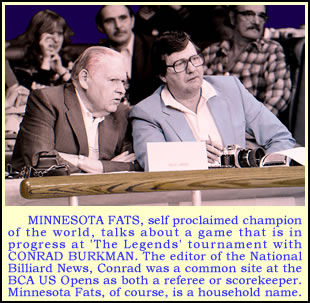
…..My purpose in writing
this article is to pay homage to all of the volunteers who stood
for long hours to bring professionalism to our sport and create
a sense of fairness throughout the competitions in the pool community.
It also serves as a teaching tool to all those players who want
to venture out into the world of organized competition. The first
rule of thumb is that the player is
ultimately responsible for knowing and following the rules and
regulations. A player should read the rule book at least once a
year to find out if any changes have been made.
…..I’ve typically seen
referees at major tournament events such as the US Open, World
Open and, usually, in the semi-finals and finals of all major tournaments.
In many other types of competitions, such as leagues, house tournaments
and regional events, there is an “area” referee who
oversees a number of matches rather than just one table. Nevertheless,
in my day, most of the officials were not “trained” except
for an hour lecture conducted in the morning of the first day of
competition. To my knowledge, there were no Referee Schools as
there are nowadays. In the early years of pool tournaments, essentially,
referees were players who volunteered their time. Some of the most
well respected officials were Carl “Cue Ball Kelly” Zingale,
Preacher Don Feeney, Conrad Burkman and Carswell “Cosmo” Ransome.
REFEREES MUST
KNOW ALL THE "REAL RULES"
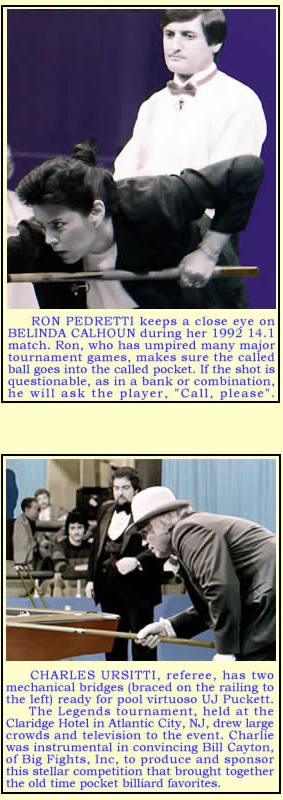
…..The
most important function of the referee is to know the rules. Personally,
I am happy to see that the Billiard Congress of America and the
World Pool-Billiard Association have come up with a
set of standardized rules. Everyone should know and follow those rules. After all,
those rules have been configured based on accounts of circumstances
that have occurred throughout the history of organized play. The
changes in equipment have also been taken into consideration. And
the entire world has had a hand in configuring those rules rather
than just in the United States. In my view, all the amateur leagues
should fall in line and use the standardized rules. There are too
many instances of players arguing over the set of laws. This is
particularly true of recreational players on seven foot tables.
…..And
it is especially upsetting when you ask the referee or the tournament
director of a local type event to make a call and they neglect
to pull out the rule book to see what is written therein. Instead,
they tend to make the call according to how they would like
or think the
rule should read. Or even worse, “we
won’t go by that rule this time.” In that system, not
only do the rules and regulations become arbitrary, that kind of
attitude promotes favoritism. According to the WPA, “The
management of an event is entitled to enforce regulations for the
event. These Regulations do not have the same force as the Rules;
the Rules have priority.”
SUSPEND PLAY, SUPPLY
EQUIPMENT AND CALL FOULS
…..”The
referee determines all matters relating to the rules, maintains
fair playing conditions, calls fouls, and takes other action as
required by the rules.”, continues
the WPA. “The referee
may decide to suspend play when conditions do not permit fair play.
Additionally,
play
is suspended then a call or ruling is being disputed and a higher
official such as the tour director is called upon to make a decision." This
includes matters of poor sportsmanship.
..... It’s
the referee’s
job to announce fouls and other specific situations as required
by the rules. He answers questions as required by the rules
on matters such as foul count. He must not give advice on
the application of the rules, or other points of play on which
he is not required by the rules to speak.” I remember being
at many a straight pool event wherein the referee, who has already
been standing for hours, would call a shot before the player approached
that particular ball. No doubt to move the game along or due to
absent mindedness. Countless times a weaker competitor would wait
until the referee made the call because he/she had figured out
the ref was calling a better pattern than he/she could. Now a day,
since referees are trained to wait for the player’s decision
and because (many of them) get paid, that rarely happens.
…..Pictured
on the right, CHARLIE URSITTI has two mechanical bridges readably
available for UJ PUCKETT in case he needs them for a shot. I recommend
that players wait for the referee to give you the bridge and let
the ref remove the bridge if it sits on the table after a shot.
This avoids the player accidentally touching an object ball when
the bridge is removed. If necessary for the shot, the referee may
hold the light fixture out of the way. The official also supplies
chalk and powder for the players.
CALL SHOTS
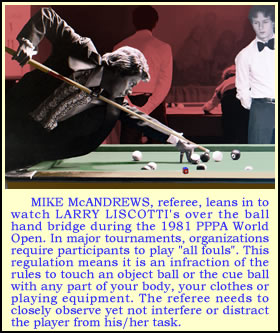
…..Besides
making sure the rules are followed, the referee makes sure of the
designated pocket for any shot that is “not obvious” like
combinations or bank shots. “Call, please” is a common
phrase heard at pool events. “When a game has a three-foul
rule, the referee should note to the players any second foul at
the time that it occurs and also when the player who is on two
fouls returns to the table. The first warning is not required by
the rules but is meant to prevent later misunderstandings.” If
there is a scoreboard on which the foul count is visible to the
players, it satisfies the warning requirement. Be careful if you
are playing in a tournament where fouls are posted because it’s
your responsibility, not the referee’s, to know you are “on
two”. A third foul, which is considered a serious foul, in
9 ball is loss of the rack and in straight pool it’s a loss
of 15 points.
.....Racking the balls is another important
function of the referee. In order to get a good spread of the balls
after a break in 8, 9, 10 or straight pool, the rack has to be
straight and tight. It was a common sight in 70s, 80s, and 90s
to see players “tapping” the balls being racked to
ensure they were tight. It was believed that if there was any space
between the balls ( ie not frozen) the player would not get a good
spread of the balls after the break. The Rules no longer allow
players to tap the balls. It is now up to the referee to decide
when the rack is secured.
PLAYERS ARE NO LONGER ALLOWED TO CHECK THE RACK

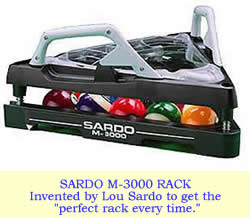
…..The SARDO RACK is a revolutionary
device invented around 2000 by, Lou Sardo, an avid pool player
who knows that a tight rack can make the difference in winning
a close pool match. The product is advertised to quickly, easily
and consistently rack the balls perfectly and fairly each time.
This is of particular interest to the spectators who have to wait
for the balls to be racked to the player’s satisfaction.
Many a time, the audience had to wait 10 minutes or more for the
balls to be properly racked. The Sardo rack comes with an easy
to use template for marking placement dots on the cloth. This will
ensure the rack is squared and centered each and every time. Simply
align the pointers on the rear of the rack with two dots on the
cloth surface. Roll the balls in the Sardo Tight Rack as directed,
one quick downward motion and you have the tightest rack possible
every time. For years it has been the official rack at many a major
tournament.
COMMON SENSE HAS ITS PLACE IN THE REFEREE ARENA
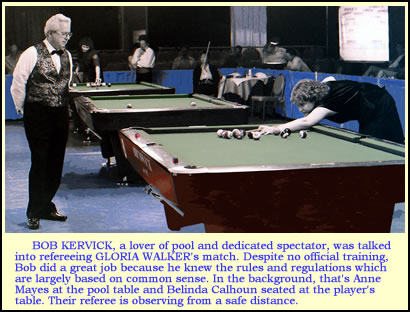
….BOB KERVICK ,
was a business man and pool fan, not a professional player. He
enjoyed playing the game socially. He made numerous contributions
to individual competitors and players organizations. When there
was a shortage of referees at the PPPA World Open in Philadelphia,
Bob volunteered his time to officiate some matches. Using his common
sense, knowledge of his own experience with the game and his respect
for players in general, Bob did a fine job. Today’s referees
are trained in organized referee schools. One may have to pay for
the training, but after moving up in the ranks of referees, the
official gets paid for officiating a match.
…..According
to JANET YBARRA, American
Cue Sports Alliance Referee Administrator, if chosen for the staff
of the ACS Nationals held each year, the pay level is as follows:
National--$350, National Senior--$375, National Head Referee--$450.
The pay rate changes for regional and other tournaments and is
determined by those events directors. As of this printing, I
was unable to get information about BCA or APA referee salaries.
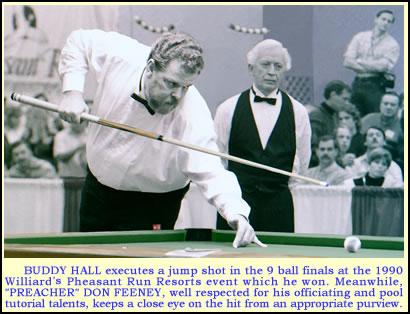
MANY REFEREES ARE GREAT PLAYERS AND TEACHERS
…..DON “PREACHER” FEENEY,
of Naperville, IL, is a knowledgeable player of all billiard games:
pool, billiards and snooker. The Preacher, who filmed his run of
152 balls, was an engineer that became facinated with the natural
science of all billiard games. Don knows the principle of physics
behind each move of the ball based on force, speed, position and
angle. He has written extensive instructional articles for
Pool & Billiard
Magazine. He has also constructed many
teaching videos that can be viewed on YouTube.
Because of his immense expertise and respectable reputation, Don
was invited to be one of the referees in the 1990 movie, “The
Color of Money”. A
player, instructor and tournament official, Don could be seen refereeing
many an important match in major pool tournaments. Here, he officiates
the finals at Jim Williard’s 1990 Pheasant Run Resorts 9
ball championship for winner BUDDY HALL.
A UNIQUE WAY TO LEARN THE GAME IS HAVING A BIRDS EYE VIEW THROUGH
REFEREEING
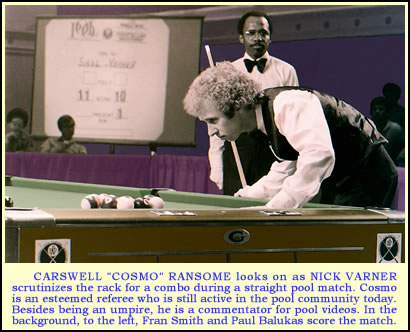
…..CARSWELL “COSMO” RANSOME,
always a gentleman, is renowned for his knowledge of the rules
and regulations in all pool games. As a matter of respect for players,
Cosmo was the ultimate invisible man while making sure players
did not commit any fouls. He had many a ‘trick’ for
maintaining the match in a constructive, prescribed manner. Read
my side note about Cosmo’s
refereeing abilities in a previous Pointers article, “The
Right Combination”. Besides officiating many a match for
PAT FLEMING’s Accu-stats streaming videos at Comet
Billiards, and more recently, “Live From The Simonis Arena” at
Breaker’s Billiards in Clifton, NJ, Carswell does commentary
on various pool competitions for both men’s and women’s
matches. Take time to tune in for some great matches streamed from
their website, http://www.ustream.tv/channel/accu-stats-on-location.
REFEREES ADD A PROFESSIONAL LOOK
TO
THE WORLD OF POCKET BILLIARDS
…..The referee’s
responsibility is to ensure that there is a fair and level playing
field for all competitors. The official maintains order, enforces
the rules in a fair, unbiased manner and serves the needs of the
players. The idea that pool players are a bunch
of "hustlers" is still too prevelant in our society even
after all the work that's been done to change the public's persona
of our beautiful sport. An important aspect of having refereees
is that we establish ourselves to the world as a professional sport.
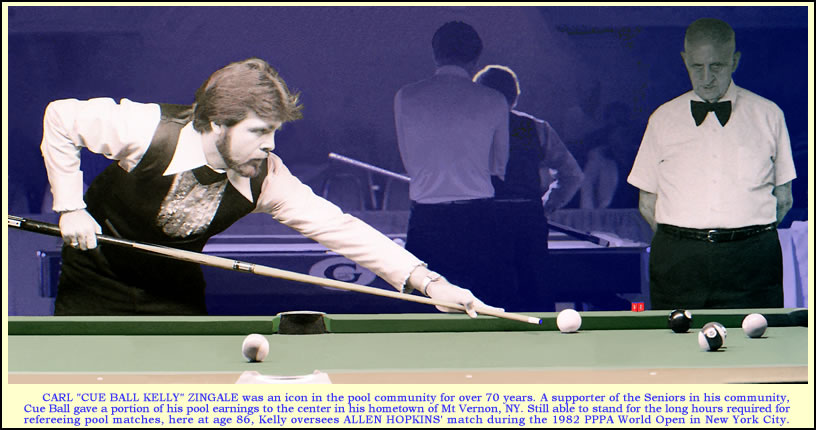
 . .
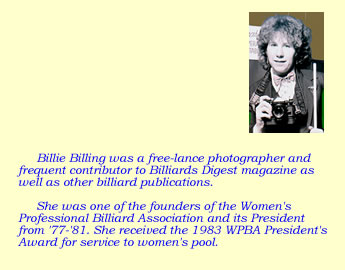
.....Pool Pointer Archives
.....1. Closed Half-Bridge
... .2. Look
Before You Leap
.....3. Mechanically
Inclined
.....4. Keep
a Level Cue
.....5. Double
or Nothing
.....6. Chalk
It Up
.....7. V-Bridge
It To Victory
.....8. The Right Combination
.....9. Referees; unsung heros
.....Tune
in for more Pointer articles coming
your way each month.

|

